Digital Poster
CEST Acquisition & Analysis
ISMRM & ISMRT Annual Meeting & Exhibition • 10-15 May 2025 • Honolulu, Hawai'i

 |
Computer Number: 33
2452. Exploring
the CEST Properties of Salicylic Acid: Implications for Enhanced
MRI Sensitivity
x. li, P-Y Wu, z. zhang, h. ma, s. ai
Shanghai Ninth People's Hospital, Shanghai Jiao Tong University School of Medicine, shanghai, China
Impact: These insights into SA as a low-toxicity probe
highlight its potential to improve CEST methodologies,
paving the way for further research on its pharmacokinetics
and applications in MRI.
|
|
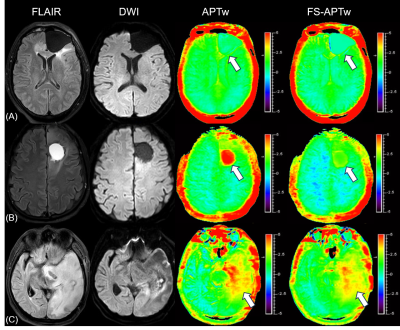 |
Computer Number: 34
2453. The
Value of Fluid-Suppressed Amide Proton Transfer-Weighted Imaging
in Suppressing Fluid Components in Post-Treatment Gliomas
J. Hou, C. Zhang, C. Su, X. Zhao, Y. Cao, S. LU
Department of Radiology, The First Affiliated Hospital of Nanjing Medical University, Nanjing, China
Impact: Our findings demonstrate the clinical potential
of FS-APTw imaging in improving the readability of APTw
images and enhancing diagnostic accuracy.
|
|
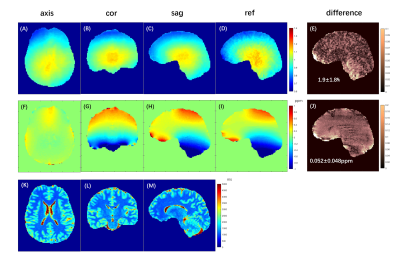 |
Computer Number: 35
2454. Rapid
Whole-Brain Mapping of B0, B1, and T1 for Unbiased CEST Imaging
in Clinical MRI
Y. Wu, S. Wang, Y. Song, J. Li
Shanghai key lab of magnetic resonance, East China Normal University, Shanghai, China
Impact: Facilitates unbiased CEST imaging in clinical
practice. Enables clinicians to detect CEST effects related
to proteins/metabolites more accurately. May stimulate new
clinical research on CEST-related topics.
|
|
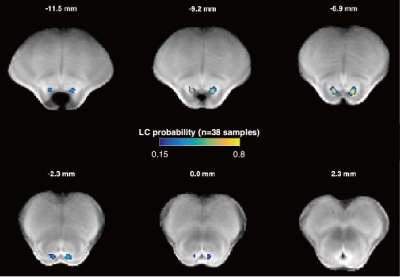 |
Computer Number: 36
2455. A
Japanese Locus Coeruleus MRI template at 7T MRI and application
for assessing the link between LC structural integrity and motor
function
A. Yokoi, I. Kida
National Institute of Information and Communications Technology, Suita, Japan
Impact: The current results highlight the importance of
using ethnically-matched brain templates to study LC in
specific ethnic group. Our results also suggest a potential
behavioral marker for assessing LC disfunction caused by PD
or AD.
|
|
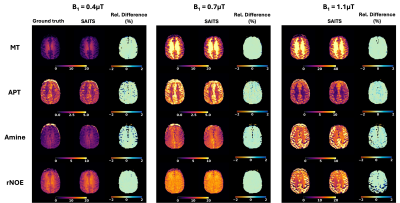 |
Computer Number: 37
2456. Accelerating
multi-contrast CEST MRI by recovery of sparsely sampled
Z-spectrum offsets and B1s using a transformer-based neural
network
A. Swain, N. Wilson, P. Jacobs, B. Benyard, R. Reddy
University of Pennsylvania, Philadelphia, United States
Impact: A
state-of-the-art transformer-based network, SAITS,
successfully recovers sparsely sampled Z-spectrum offsets
and B1s,
allowing for multi-contrast CEST MRI and B1 inhomogeneity
correction. Given low reconstruction error and high image
fidelity, this method facilitates rapid clinical translation
of Z-spectrum acquisitions.
|
|
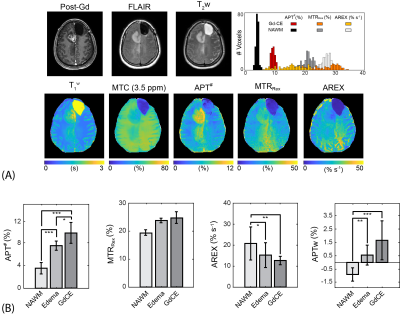 |
Computer Number: 38
2457. Influence
of RF saturation parameters and CEST quantification metrics on
human brain tumor contrast
S. Z. Mahmud, M. Singh, J. Zhou, H-Y Heo
The Johns Hopkins University School of Medicine, Baltimore, United States
Impact:
This study sheds light on the influence of RF saturation parameters and CEST quantification metrics on brain tumor assessment. The choice of CEST metric must be carefully considered according to RF saturation parameter settings. |
|
 |
Computer Number: 39
2458. Plus-minus
CrCEST provides higher temporal resolution mapping of skeletal
muscular creatine
R. Burman, J. Valley, Y. Pang, P. Bagga
St. Jude Children's Research Hospital, Memphis, United States
Impact: The Plus-Minus CrCEST approach achieves a
threefold increase in temporal resolution for creatine
recovery mapping in skeletal muscle, aligning τCrCEST values
with 31P-MRS and broadening CrCEST's potential for advanced
metabolic and physiological research applications.
|
|
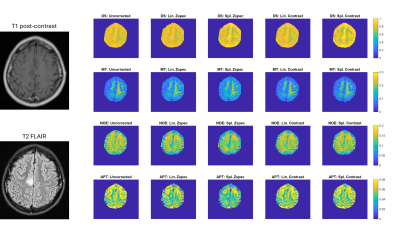 |
Computer Number: 40
2459. Testing
the Efficacy of Retrospective B1+ Inhomogeneity Correction for
7T Chemical Exchange Saturation Transfer Imaging of Human Glioma
Y. Lan, A. Henning
University of Texas Southwestern Medical Center, Dallas, United States
Impact: Retrospective correction for B1+ inhomogeneity
has limited effects in improving CEST image quality acquired
using CP mode at 7T, thus presenting a demand for
alternative methods to archive homogeneous CEST contrast at
time of acquisition.
|
|
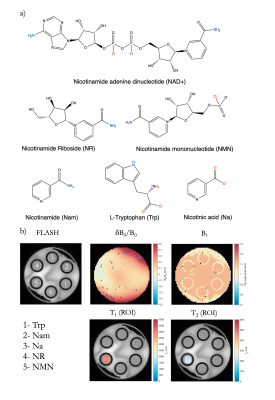 |
Computer Number: 41
2460. Insights
from the Characterisation of the NAD+ Biosynthesis Pathway via
in-vitro CEST MRI
F. Slade, W. Lam, J. Collingwood, G. Stanisz
University of Warwick, Coventry, United Kingdom
Impact: This study may impact neurodegenerative disease
research by enabling precise CEST MRI-based tracking of NAD+
metabolism, specifically adenosine-linked pathways as
elucidated (2.03ppm). This could deepen understanding of
metabolic disruptions, opening new avenues for early
diagnosis and targeted therapeutic monitoring.
|
|
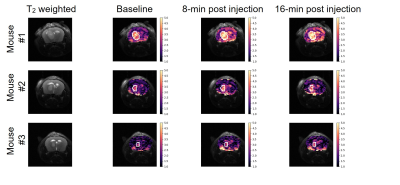 |
Computer Number: 42
2461. Metabolic
CEST MR imaging of glucosamine uptake in brain tumors
Y. Yosha, M. Rivlin, G. Navon, O. Perlman
Tel Aviv University, Tel Aviv, Israel
Impact: This is the first study that examines the use of
GlcN for brain tumor imaging. Given its low toxicity and
transport capabilities across the blood-brain barrier (BBB),
GlcN may be used as a nonmetallic contrast agent for
evaluating brain malignancies.
|
|
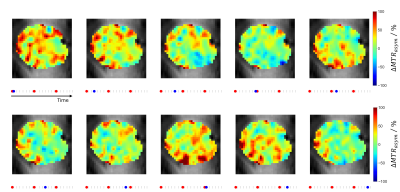 |
Computer Number: 43
2462. Model-based
Analysis of Renal Dynamic Glucose Enhanced (DGE) MRI
C. Lippe, V. Hoerr
University of Münster, Münster, Germany
Impact: This work provides a refined method based on
Bloch-McConnell fitting for quantifying renal DGE MRI data,
enabling clearer insights into renal function and pathology.
It opens new pathways for studying regional kidney
metabolism and renal diseases.
|
|
 |
Computer Number: 44
2463. A
T1-independent evaluation method for steady state CEST signals
S. Mayer, F. Gutjahr, L. Borisjuk, P. Jakob
University of Würzburg, Würzburg, Germany
Impact: The T1-dependence of spoiled gradient echo
ssCEST-signals can be eliminated and corrected by using the
proposed analytical evaluation metric based on a
double-angle approach.
|
|
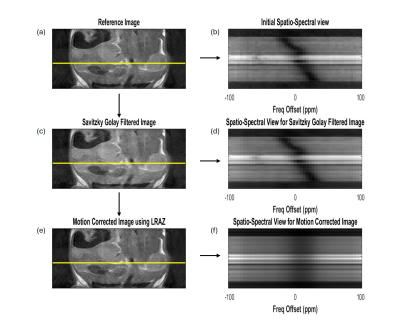 |
Computer Number: 45
2464. Motion-robust
accelerated in vivo CEST MRI of perirenal fat with keyhole
k-space acquisition
Z. Ahasan, M. Shaghaghi, Z. Cai, K. Cai
University Of Illinois at Chicago, Chicago, United States
Impact: This novel integration of motion correction
techniques with accelerated acquisition enables
motion-robust in vivo CrCEST
imaging of perirenal fat, potentially advancing our
understanding of adipose tissue metabolism in
obesity-related disorders while significantly reducing
patient scan times.
|
|
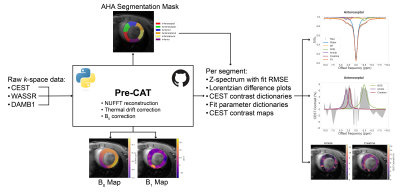 |
Computer Number: 46
2465. Pre-CAT:
Open-source tools for pre-clinical CEST-MRI data analysis
J. Weigand-Whittier, C. Ayala, B. Lam, M. Velasquez, S.
Rubin, M. Vandsburger
UC Berkeley, Berkeley, United States
Impact: CEST is a valuable tool for imaging biochemical
changes in pre-clinical disease models, yet remains
underutilized due to the prevalence of proprietary data
analysis scripts. Pre-CAT promotes the adoption of
pre-clinical CEST-MRI and implements consensus standards for
analysis and presentation.
|
|
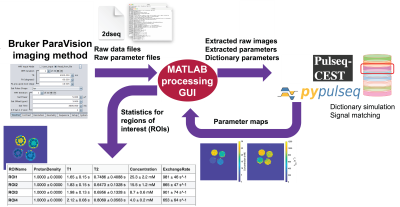 |
Computer Number: 47
2466. Turnkey
Preclinical CEST-MRF for Bruker ParaVision 360
D. Korenchan, S. Madi, N. Vladimirov, T. Sasser, T. Wokrina,
O. Perlman, C. Farrar
Athinoula A. Martinos Center for Biomedical Imaging, Charlestown, United States
Impact: The Bruker ParaVision 360 imaging method and
processing pipeline we developed is publicly available and
will facilitate CEST-MRF imaging development by making
experiments easy to customize and analyze, spurring more
rapid CEST-MRF development towards clinical imaging.
|
|
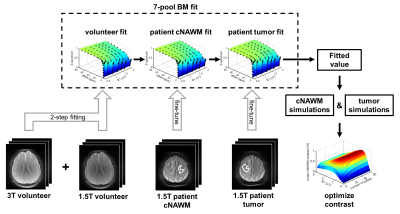 |
Computer Number: 48
2467. Optimization
of CEST saturation parameters at 1.5T for brain tumor imaging
Z. Dai, Y. Zheng, H. Chen, Y-C Hsu, K. Liu, H. Qian, Y.
Zhang
Key Laboratory for Biomedical Engineering of Ministry of Education, Department of Biomedical Engineering, College of Biomedical Engineering & Instrument Science, Zhejiang University, Hangzhou, Zhejiang, China
Impact:
Our optimized CEST saturation parameters maximizes tumor contrast at 1.5T, facilitating the applicability of CEST MRI with reduced SNR and a coarser spectral resolution at 1.5T. |
The International Society for Magnetic Resonance in Medicine is accredited by the Accreditation Council for Continuing Medical Education to provide continuing medical education for physicians.